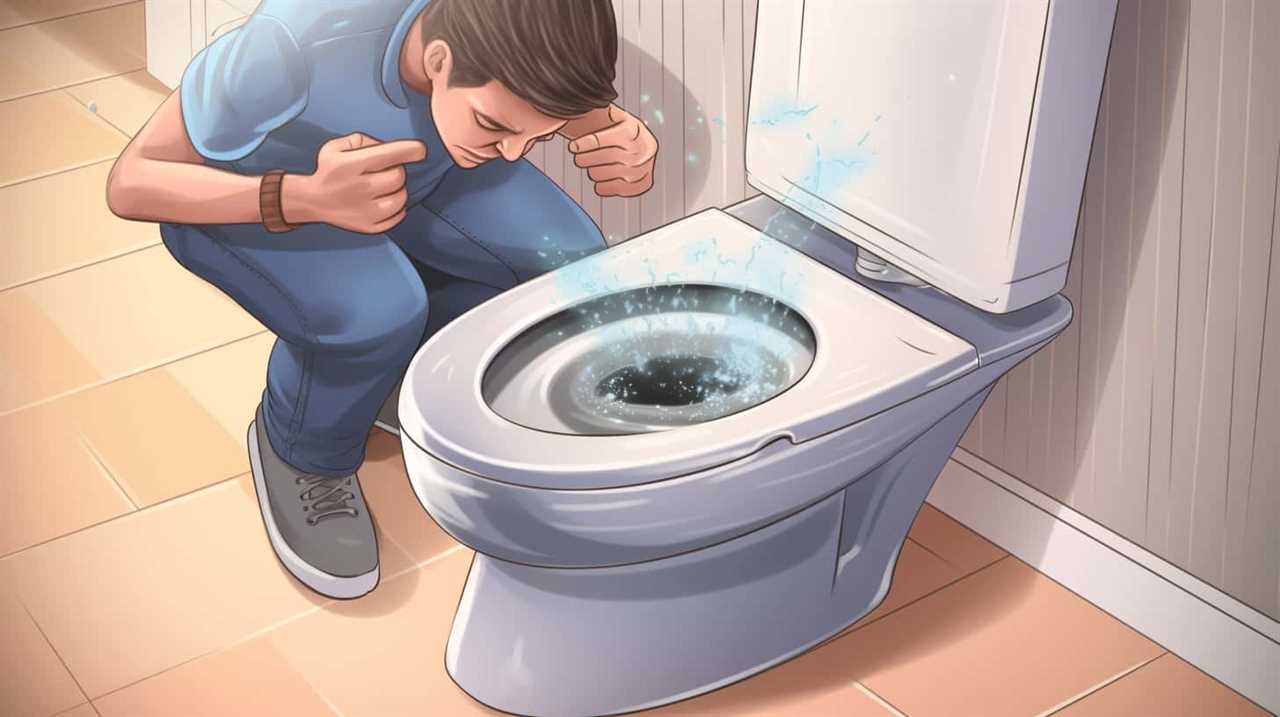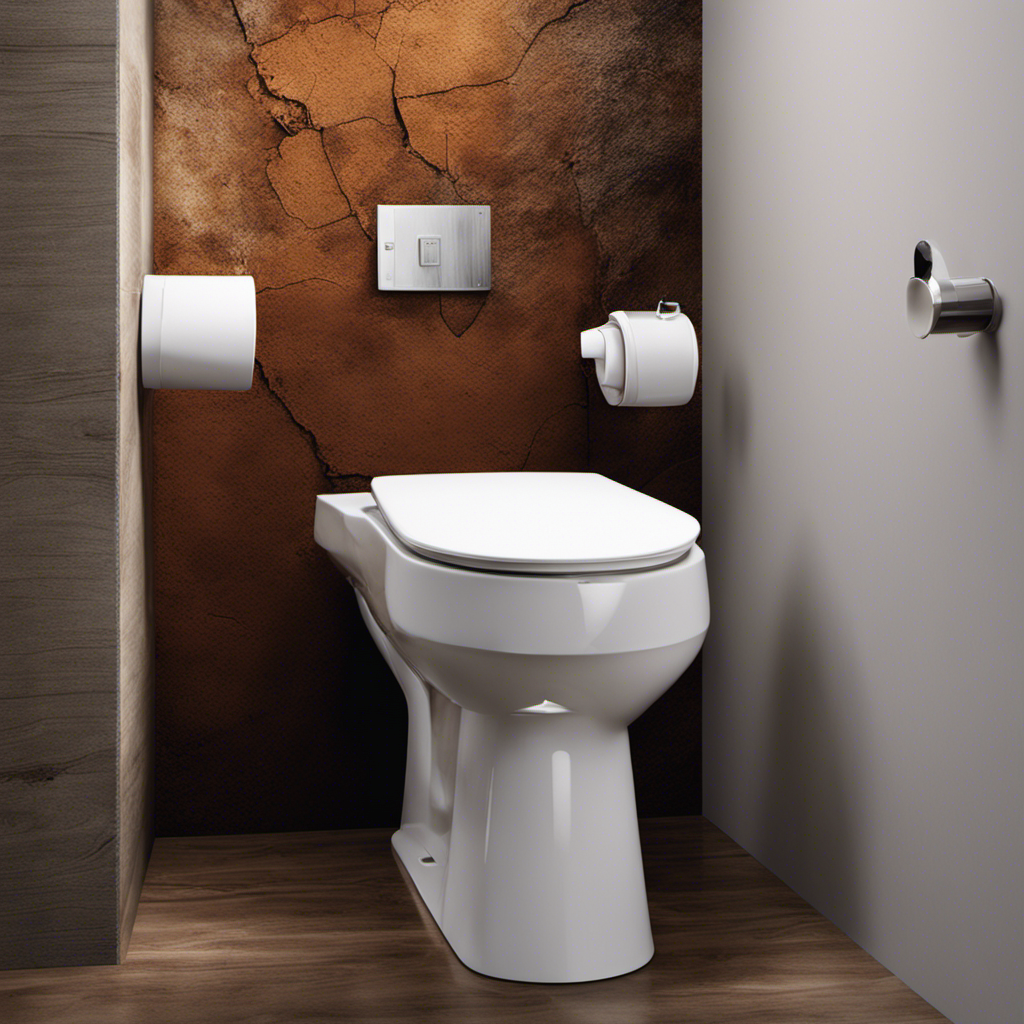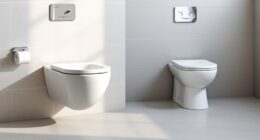In this piece, we’ll delve into the items that should never be flushed down a septic system.
We’ve compiled a list of non-biodegradable materials, such as paper towels and baby wipes, that can cause serious damage.
We’ll also delve into why items like grease, feminine hygiene products, and condoms should never be flushed.
Additionally, we’ll discuss the impact of cat litter, coffee grounds, and hair on your septic system.

Stay tuned to learn how to properly maintain your septic system and avoid costly repairs.
Key Takeaways
- Non-biodegradable materials can clog pipes, damage the septic tank, and contaminate soil and water sources, so they should be disposed of in designated waste management facilities.
- Flushing grease and cooking oil can clog septic pipes, harm the bacteria in the septic tank, and contaminate groundwater, so they should be disposed of in a proper manner.
- Feminine hygiene products can clog pipes, damage the septic system, and contribute to pollution and harm marine life, so they should be wrapped in toilet paper or disposed of in trash receptacles.
- Baby wipes and diapers are non-flushable items that can clog septic systems, so they should be disposed of in trash receptacles to avoid damage and costly repairs.
Non-Biodegradable Materials
We should avoid flushing non-biodegradable materials in our septic systems. Non-biodegradable materials are substances that don’t break down naturally over time. When these materials are flushed into our septic systems, they can cause significant problems. They can clog pipes, block the flow of wastewater, and even damage the septic tank itself.
Additionally, the environmental impact of disposing non-biodegradable materials in our septic systems is concerning. These materials can contaminate the soil and water sources, leading to pollution and harm to ecosystems.
It’s important to find alternatives for disposal of non-biodegradable materials, such as recycling or disposing of them in designated waste management facilities. By doing so, we can protect our septic systems, prevent pollution, and promote a healthier environment for all.

Grease and Cooking Oil
When it comes to septic systems, it’s important to avoid flushing grease and cooking oil down the drain. These substances can easily clog septic pipes, leading to costly repairs and potential backups.
Additionally, grease and cooking oil can be harmful to the bacteria in the septic tank that help break down waste. Proper disposal of these substances is crucial for the longevity and efficiency of your septic system.
Clog Septic Pipes
One common cause of clogged septic pipes is the improper disposal of grease and cooking oil. When these substances are poured down the drain, they can solidify and accumulate in the pipes, obstructing the flow of wastewater. This can lead to backups and costly repairs.
Here are four reasons why you should never flush grease and cooking oil in your septic system:

- Clogs: Grease and cooking oil can harden and form blockages in the pipes, preventing proper wastewater flow and causing backups.
- Septic Tank Overload: Excessive grease and oil can overwhelm the septic tank, reducing its capacity to treat and break down solid waste.
- Damage to the Drainfield: The accumulation of grease and oil can seep into the drainfield, clogging the soil and hindering its ability to filter and treat wastewater.
- Environmental Impact: Improperly disposed grease and cooking oil can contaminate groundwater, posing risks to public health and the environment.
To prevent clogs and maintain a healthy septic system, always dispose of grease and cooking oil in a designated container and dispose of it properly, such as through recycling or solid waste collection. Regular septic system maintenance, including pumping and inspection, is also crucial to ensure its proper functioning.
Harmful to Bacteria
The accumulation of grease and cooking oil in a septic system can be harmful to the bacteria responsible for breaking down solid waste. When these substances are flushed into the septic tank, they can form a layer of scum on the surface, preventing oxygen from reaching the bacteria.
This lack of oxygen inhibits the bacteria’s ability to break down waste effectively, leading to a decrease in the overall efficiency of the system. Furthermore, the buildup of grease and cooking oil can also clog the drain field, causing wastewater to back up into the house or seep into the surrounding environment.
Regular septic tank maintenance, including proper disposal of grease and cooking oil, is essential to prevent these issues and minimize the impact on the ecosystem.

Feminine Hygiene Products
We regularly dispose of feminine hygiene products in the trash rather than flushing them down the toilet. This is because these products, such as tampons and sanitary pads, can cause significant issues when flushed into a septic system.
Here are four reasons why it’s important to avoid flushing feminine hygiene products:
- Clogging: Feminine hygiene products can easily clog the pipes and obstruct the flow of wastewater. This can lead to costly repairs and backups in the plumbing system.
- Damage to the septic system: Flushing these products can damage the septic system by causing blockages and reducing its efficiency. This may result in the need for repairs or even replacement of the entire system.
- Environmental impact: When feminine hygiene products are flushed, they can end up in water bodies, where they contribute to pollution and harm marine life. This is detrimental to the environment and can have long-lasting effects.
- Alternatives for disposal: Instead of flushing, it’s recommended to wrap used feminine hygiene products in toilet paper or place them in a disposal bag before throwing them in the trash. This ensures proper disposal without causing harm to the septic system or the environment.
Baby Wipes and Diapers
When it comes to maintaining a healthy septic system, it’s important to understand what items should never be flushed.
Baby wipes and diapers are commonly mistaken as flushable, but they can cause serious issues for septic tanks. These non-flushable items can clog the system and lead to costly repairs.
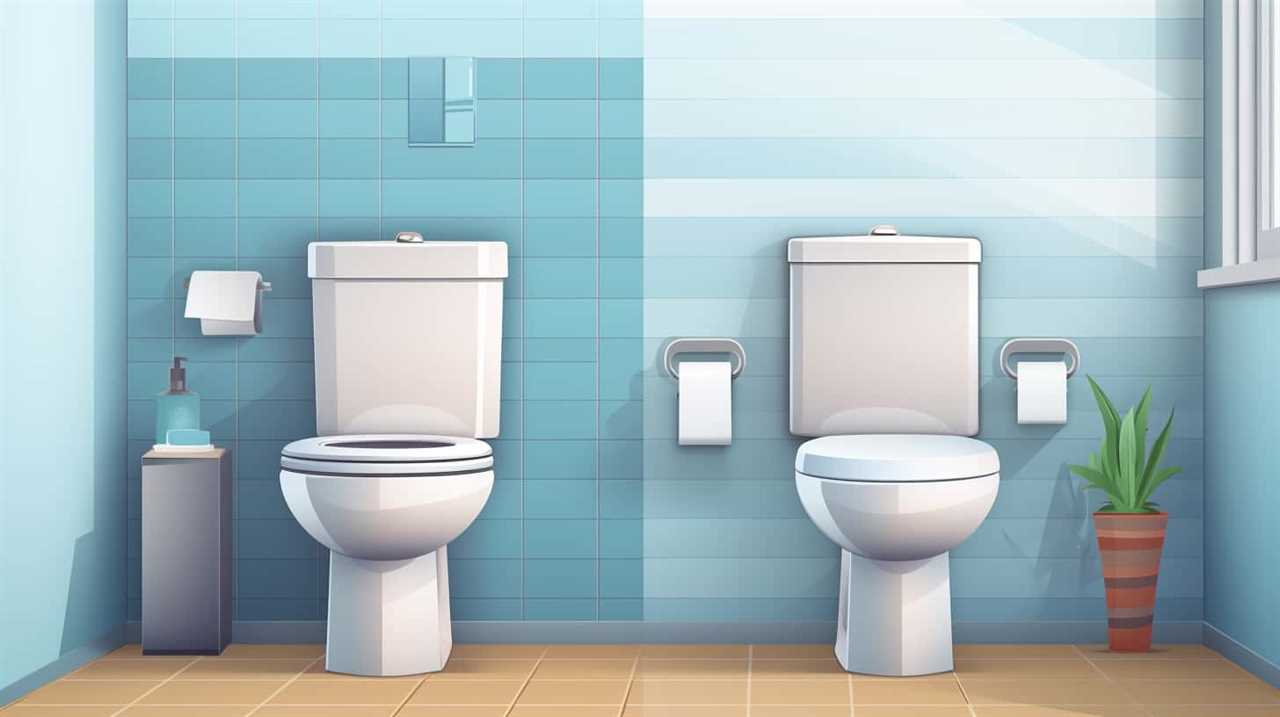
To avoid such problems, it’s crucial to dispose of baby wipes and diapers in the proper trash receptacles.
Non-Flushable Items Explained
Baby wipes and diapers aren’t suitable for flushing in a septic system. Flushing these items can cause clogs and damage to the septic system, leading to costly repairs. It’s important to understand the reasons why these items shouldn’t be flushed and consider alternative methods for disposal.
Here are four reasons why baby wipes and diapers shouldn’t be flushed in a septic system:
- Clogging: Baby wipes and diapers don’t break down easily in water, causing them to accumulate and clog pipes and the septic tank.
- Damage to the septic system: Flushing these items can lead to damage to the septic tank and drain field, resulting in expensive repairs or even the need for a complete system replacement.
- Environmental impact: Baby wipes and diapers that end up in the septic system can eventually make their way into groundwater and nearby bodies of water, causing pollution and harm to aquatic life.
- Alternative disposal methods: Dispose of baby wipes and diapers in the trash, using a diaper pail with a tightly sealed lid to contain any odors. Consider using biodegradable and compostable diapers as a more environmentally friendly option.
Impact on Septic Tanks
After learning about the reasons why baby wipes and diapers shouldn’t be flushed in a septic system, it’s important to understand their specific impact on septic tanks.
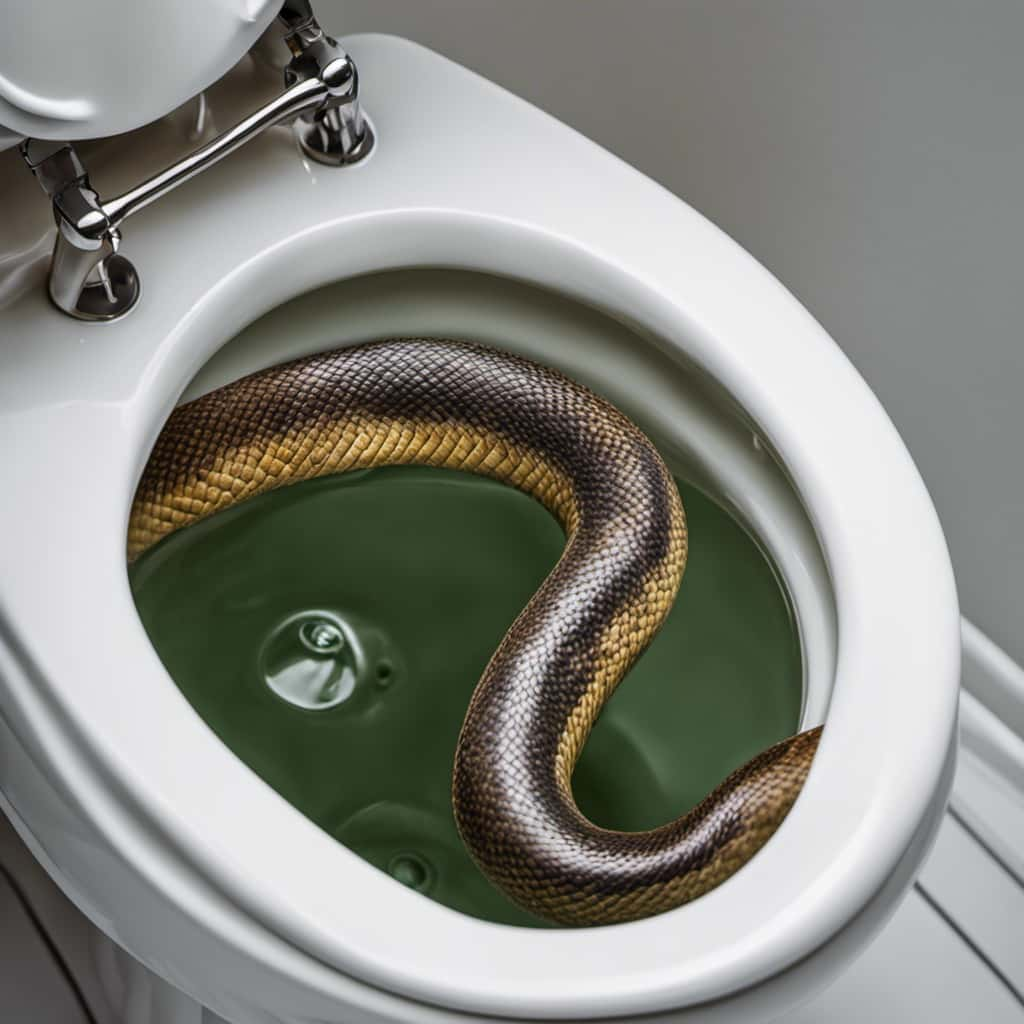
Baby wipes and diapers aren’t biodegradable like toilet paper, and as a result, they can cause significant problems in septic tanks. These items don’t break down easily and can clog the system, leading to blockages and backups. The accumulation of baby wipes and diapers in the tank can also reduce its capacity to hold wastewater, leading to more frequent pumping and maintenance.
Additionally, the disposal of these items in septic systems has an adverse environmental impact. When not properly disposed of, these items can end up in water bodies, negatively affecting marine life. It’s crucial to consider alternatives for disposal, such as placing them in a trash bin, to prevent these issues and protect the environment.
Alternatives for Disposal
To properly dispose of baby wipes and diapers, it’s important to consider our alternatives. Here are four proper disposal methods for baby wipes and diapers:
- Trash Bin: The most common method is to place soiled baby wipes and diapers in a tightly sealed plastic bag and dispose of them in the trash bin. This ensures that they’re safely contained and won’t cause any harm to the environment.
- Diaper Pail: Invest in a diaper pail specifically designed to contain odors. These pails have a sealed lid and a special bag that can be tied off and disposed of in the trash when full.
- Alternatives for Composting: Some eco-conscious individuals choose to compost biodegradable baby wipes and diapers. However, it’s essential to ensure that the composting process reaches high enough temperatures to break down the materials effectively.
- Diaper Collection Service: In some areas, there are diaper collection services available. These services collect used diapers and wipes and dispose of them in an environmentally friendly manner.
Condoms and Birth Control Devices
When disposing of condoms and birth control devices in a septic system, it’s important to remember that these items should never be flushed down the toilet. Condoms and other birth control devices aren’t designed to break down in water and can cause serious damage to septic systems. Flushing condoms can lead to clogs in the pipes, which can result in costly repairs.

Additionally, these items can end up in the septic tank, where they can cause blockages and interfere with the natural decomposition process. Proper condom disposal involves wrapping the used condom in tissue or toilet paper and placing it in a trash bin. This ensures that the condom will be safely disposed of without causing harm to the septic system.
Prescription Medications
We should also be mindful of the medications we flush in a septic system, as certain prescription drugs can have detrimental effects on its functioning. It’s important to practice safe disposal methods for prescription medications to prevent contamination of groundwater and potential harm to the environment.
Here are four safe disposal methods for prescription drug disposal:
- Take-back programs: Many pharmacies and healthcare facilities offer take-back programs where you can return unused or expired medications for proper disposal.
- Mail-back programs: Some organizations provide prepaid envelopes or containers for mailing back unused medications to a designated facility for disposal.
- Drug deactivation systems: These systems use pouches or containers that chemically deactivate medications, making them safe for disposal in regular household trash.
- Community disposal events: Local communities often organize events where you can drop off your unused medications for proper disposal.
Household Cleaning Products
Continuing our consideration of potential septic system hazards, let’s now address the impact of household cleaning products.

When it comes to septic systems, it’s crucial to be mindful of the products we use and how we dispose of them. Many common household cleaning products contain chemicals that can be harmful to septic systems and the environment. The improper disposal of these products can lead to contamination of groundwater and damage to the delicate balance of bacteria in the septic tank.
To avoid these issues, it’s important to explore alternatives for disposal. Look for environmentally friendly cleaning products that are labeled as septic safe. Additionally, consider using natural cleaning methods, such as vinegar and baking soda, which have minimal impact on the environment.
Paints and Solvents
When it comes to maintaining a healthy septic system, it’s important to be cautious about what we flush down the drain. Paints and solvents should never be disposed of in a septic system, as they contain harmful chemicals that can disrupt the balance of bacteria and enzymes that break down waste.
Not only can these chemicals damage the septic tank and pipes, but they also pose a threat to the environment when improperly disposed of. It’s crucial to find alternative methods for disposing of paints and solvents, such as taking them to a hazardous waste facility.
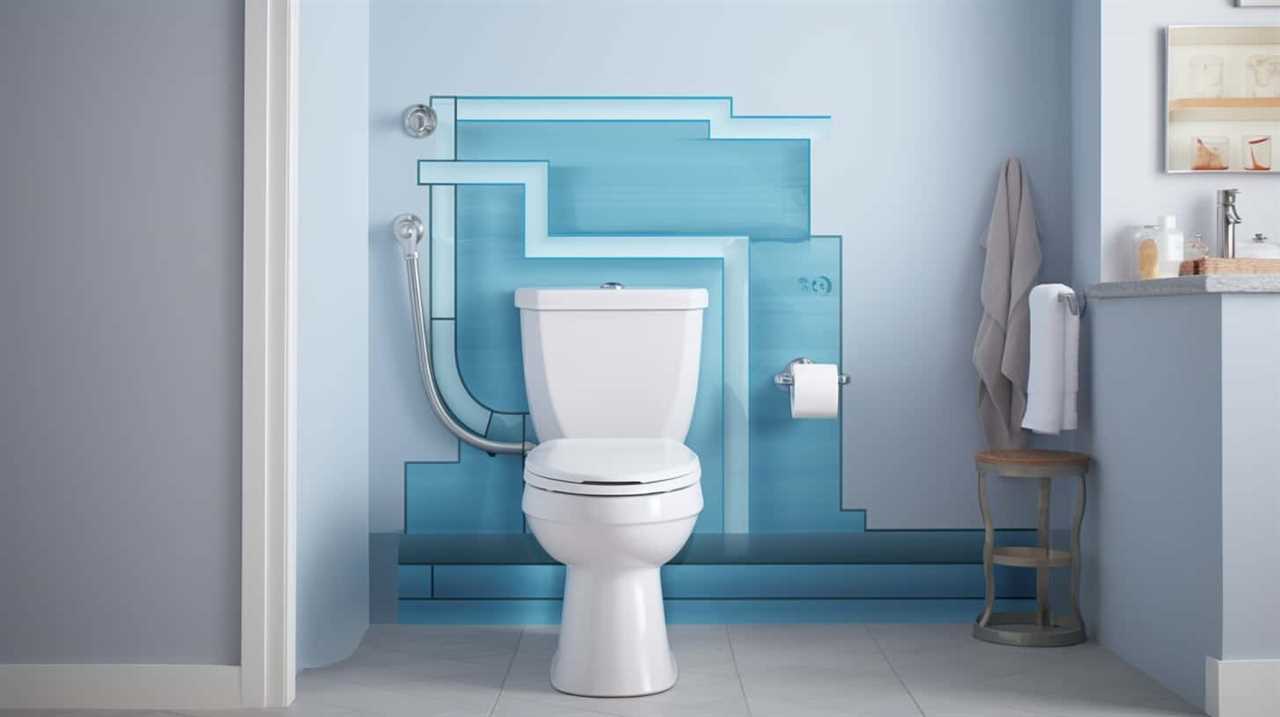
Harmful Chemicals to Avoid
Typically, we should avoid flushing paints and solvents into a septic system. These harmful chemicals can have a detrimental impact on groundwater quality, causing contamination and posing serious risks to human health and the environment.
To ensure the proper disposal of paints and solvents, consider the following alternatives:
- Use water-based or latex paints instead of oil-based paints. Water-based paints are less harmful and can be easily cleaned with soap and water.
- Opt for non-toxic or low-VOC (volatile organic compound) solvents. These solvents are safer for both your septic system and the environment.
- Dispose of leftover paints and solvents at designated drop-off locations or through specialized waste management programs. This ensures proper handling and prevents contamination.
- Consider recycling or donating unused paints and solvents to minimize waste and promote sustainability.
Environmental Impact of Disposal
To understand the environmental impact of disposal for paints and solvents in a septic system, it’s important to recognize the potential risks they pose to groundwater quality.
When these substances are improperly disposed of, they can seep into the ground and contaminate the groundwater, which serves as a source of drinking water for many communities.

Paints and solvents contain various chemicals, such as volatile organic compounds (VOCs), that can be harmful to human health and the environment. These chemicals can persist in the groundwater for extended periods, leading to long-term contamination.
Moreover, the improper disposal of paints and solvents in a septic system can have legal implications. In many jurisdictions, it’s illegal to dispose of hazardous substances in septic systems, and violations can result in fines and penalties.
Therefore, it’s crucial to properly dispose of paints and solvents to prevent their impact on groundwater and avoid legal consequences.
Paper Towels and Tissues
We should never flush large quantities of paper towels and tissues in a septic system. Doing so can have a detrimental impact on the system’s performance and can lead to costly repairs. Here are four reasons why you should avoid flushing paper towels and tissues in your septic system:

- Clogging: Paper towels and tissues don’t break down easily like toilet paper does. As a result, they can clog the pipes and cause backups in your septic system.
- Septic tank filling: Paper towels and tissues take longer to decompose compared to toilet paper. This can lead to your septic tank filling up faster, requiring more frequent pumping.
- Damage to the drain field: Excessive paper towel and tissue waste can also damage the drain field, reducing its effectiveness in filtering and treating wastewater.
- Alternatives for disposal: Instead of flushing paper towels and tissues, consider disposing of them in a trash can or using eco-friendly alternatives like reusable cloth towels or handkerchiefs.
Cat Litter and Pet Waste
Moving on from the previous subtopic, let’s now delve into the issue of properly disposing of cat litter and pet waste in a septic system.
When it comes to cat litter, it’s crucial to avoid flushing it down the toilet. Cat litter is often made of clay or silica, which can clog pipes and cause blockages in your septic tank. Instead, consider using alternatives for disposal, such as composting or wrapping the waste in biodegradable bags and disposing of it in the trash.
As for pet waste, flushing it down the toilet may seem convenient, but it can have a negative impact on septic tanks. Pet waste contains harmful bacteria and parasites that can contaminate groundwater, leading to potential health risks. It’s best to collect and dispose of pet waste in a separate trash bag, ensuring it’s properly sealed.
Coffee Grounds and Tea Bags
When it comes to the disposal of coffee grounds and tea bags in a septic system, it’s important to refrain from flushing them down the toilet. Here are four reasons why:

- Clogging: Coffee grounds and tea bags don’t break down easily in water and can accumulate in the septic tank, leading to clogs in the system.
- Damage to the Septic System: The accumulation of coffee grounds and tea bags can hinder the proper functioning of the septic system, causing backups and costly repairs.
- Impact on Groundwater Quality: When flushed, the coffee grounds and tea bags can seep into the groundwater, potentially contaminating it with harmful substances.
- Alternatives for Composting: Instead of flushing, consider composting coffee grounds and tea bags. They can be added to a compost pile or used as a soil amendment, providing nutrients to plants while reducing waste.
Hair and Personal Care Products
Continuing with the topic of what not to flush in a septic system, it’s important to be mindful of the disposal of hair and personal care products.
When it comes to our haircare routine, it’s essential to remember that hair shouldn’t be flushed down the toilet or washed down the drain. This is because hair doesn’t break down easily and can cause blockages in the septic system.
Additionally, personal care products such as shampoos, conditioners, and body washes shouldn’t be disposed of in the toilet or drain. These products can contain chemicals that may disrupt the natural balance of bacteria in the septic tank, leading to potential issues with septic system maintenance.
To prevent any issues, it’s best to dispose of hair and personal care products in the trash instead.
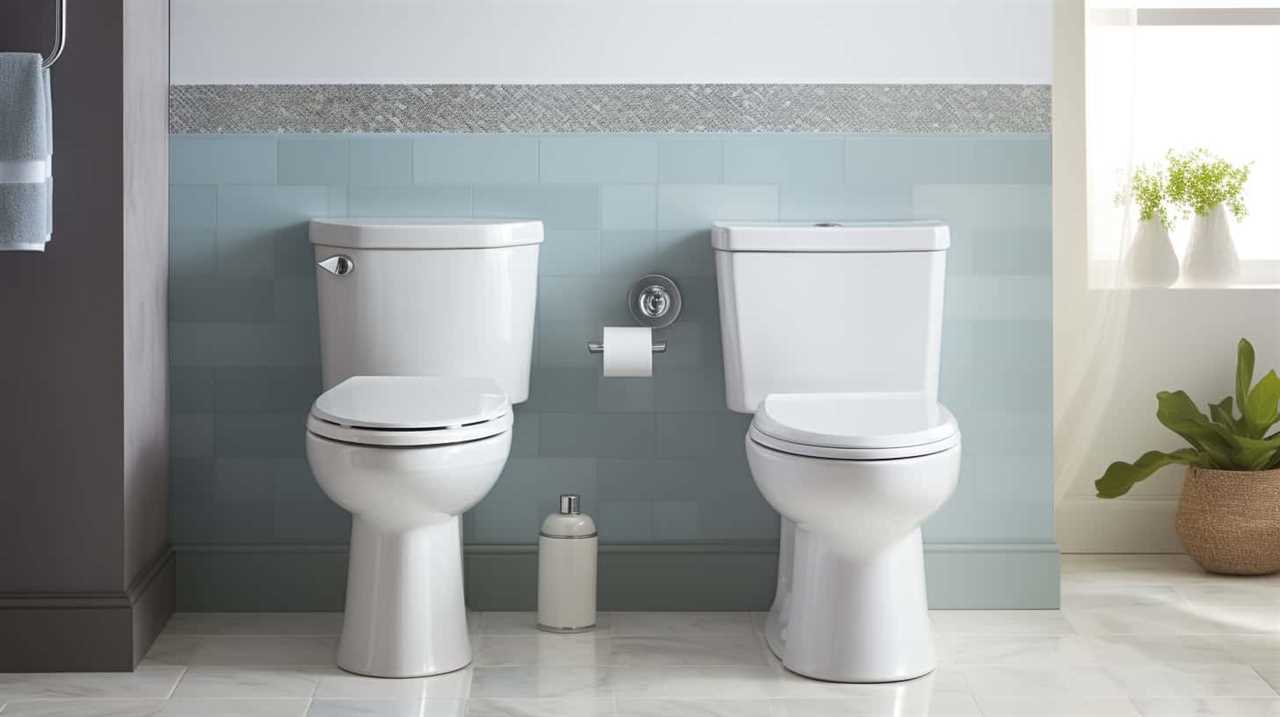
Conclusion
In conclusion, it’s crucial to be mindful of what we flush in our septic systems. Non-biodegradable materials, grease, feminine hygiene products, baby wipes, condoms, paper towels, cat litter, coffee grounds, and hair care products can cause serious damage.
Just like a delicate ecosystem, a septic system depends on balance and harmony. One wrong item can disrupt the entire system, leading to costly repairs and environmental harm.
Let’s treat our septic systems with respect and protect the environment in the process.



